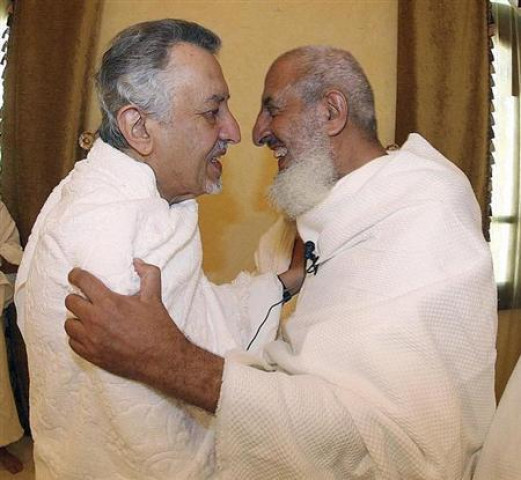Saudi religious leader urges youth not to fight in Syria
"I advise them (preachers) to advise (young people) as they would advise their sons," says Sheikh Abdulaziz al...

Saudi Grand Mufti Sheikh Abdul-Aziz al Sheikh (R) embraces Saudi Prince Khaled Al Faisal, Emir of Mecca, at Namira Mosque on the plains of Arafat, outside Mecca. PHOTO: REUTERS
The kingdom has backed the rebels battling President Bashar al-Assad, publicly calling on the world powers to "enable" Syrians to protect themselves, but is wary that fighters could return home ready to wage war on their own dynastic rulers.
Sunnis in Saudi Arabia denounce Assad and his administration as infidels because of their roots in the Alawite sect, an offshoot of Shia sect.
However, Sunni al Qaeda fighters led by Saudi-born Osama bin Laden attacked targets inside Saudi Arabia between 2003 and 2006, having gained experience fighting in Iraq, and before that in Afghanistan and elsewhere.
"This is all wrong, it's not obligatory," Sheikh Abdulaziz al Sheikh said, in reference to Saudi men joining a civil war that is now in well into its third year, according to pan-Arab daily al Hayat.
"These are feuding factions and one should not go there. I do not advise one to go there ... Going to a land that you do not know and without experience, you will be a burden to them, what they want from you is your prayer."
A Gulf source familiar with military movements in the region said in September 2012 thousands of Saudis had sought to head to Syria to join the uprising. It is not known how many succeeded.
The grand mufti, appointed by the Saudi king, also warned preachers against encouraging young men to fight in Syria during their sermons, after delivering what the paper said was a lecture on "Deviation among the youth" at a mosque.
"Muslim should be fearful of God and not deceive young Muslims and exploit their weakness and lack of insight and push them to an abyss," the mufti was quoted by the paper on Monday.
"I advise them (preachers) to advise (young people) as they would advise their sons."
Bin Laden led a battalion of Arab volunteers fighting against the Soviet forces occupying Afghanistan in the 1980s, while others joined local Muslim forces in civil wars in the 1990s in Bosnia and Chechnya.
But even before he sent 15 Saudis and four other Arabs to carry out the September 11 attacks on the United States in 2001, bin Laden had turned against the Saudi Arabia's ruling al Saud family, mainly because of its close relationship with the West.
That relationship, especially with its oldest ally the United States, has cooled somewhat over the past months over the failure to end the war in Syria and a softening of tone towards arch-rival Shia Iran.



















COMMENTS
Comments are moderated and generally will be posted if they are on-topic and not abusive.
For more information, please see our Comments FAQ